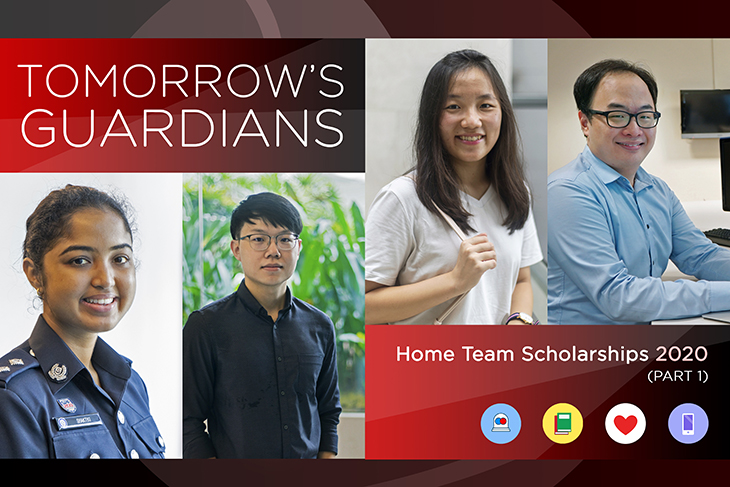-013142e3760a1e429b943601a4e9992369.png?sfvrsn=3a5ca184_0)
In Part 1, we saw how civilian and uniformed officers from the Singapore Police Force (SPF), Immigration and Checkpoints Authority (ICA) and Central Narcotics Bureau (CNB) collaborated to stop “Ben” from bringing in drugs at the checkpoints.
What happens to “Ben” next? Read on to find out!
Taking over the investigations into the case, ASP Wong Jun Jie proceeds with interviewing “Ben”.
-02.png?sfvrsn=39b8873a_0)
ASP Wong conducts preliminary interview of the suspect at the scene. PHOTO: Dayana Yakob
Meanwhile, officers continue to search the suspect’s vehicle, and finds drug paraphernalia underneath the carpet of the car.
-03.png?sfvrsn=28155906_0)
A CNB officer seizes drug paraphernalia found in the suspect’s car. PHOTO: Dayana Yakob
To gather more evidence of “Ben’s” activities, ASP Wong and his team bring “Ben” back to his residence for a thorough search.
-04.png?sfvrsn=4631efce_0)
Thorough planning is key to every anti-drug operation. Before conducting any anti-drug operations, CNB officers gather intelligence and analyse data.
“Sometimes, we might encounter hostile suspects who are uncooperative and aggressive when we attempt to arrest him or her,” ASP Wong explained.
“This is why we go out as a team when conducting operations. Each officer is briefed on his or her assigned role beforehand. We are trained to react to various situations while keeping in mind the safety of the public, our team members, as well as the drug offenders themselves.”
-07.png?sfvrsn=f355c3b_0)
-06.png?sfvrsn=a12278bf_0)
PHOTOS: Joash Tan & Dayana Yakob
According to ASP Wong, some suspects are creative and secure their drugs in inconspicuous places, thinking that they would not be checked.
“I’ve personally found drugs hidden in a laundry bag with clothes piled on top of it,” he said. “As law enforcers, we are trained to look into every nook and cranny of the place so that we don’t miss out on any clue.”
-08.png?sfvrsn=e5d00c26_0)
Drugs can be found at both the most likely and unlikely places. PHOTO: Dayana Yakob
-09.png?sfvrsn=d26738ea_0)
The haul of drugs seized. PHOTO: Dayana Yakob
With the remaining drugs seized, “Ben” was brought back to CNB HQ by ASP Wong and his team for a urine test and further questioning. The urine sample will be sent to the Health Sciences Authority for a detailed analysis.
-10.png?sfvrsn=c9c4439a_0)
Investigations continue with further questioning of “Ben” as ASP Wong builds the case with objective evidence such as CCTV footages.
-11.png?sfvrsn=4e7c3ff1_0)
ASP Wong conducts in-depth interview of “Ben”. PHOTO: Joash Tan
Upon his conviction and court sentencing, “Ben” serves out his sentence and begins his rehabilitation journey in prison or at a drug rehabilitation centre.
In Singapore Prisons Service (SPS), inmates are assigned to Correctional Unit Officers, like ASP Mohammed Farish Bin Azman, who enforces secure custody of inmates and supports them in their rehabilitation journey.
-12.png?sfvrsn=2d811051_0)
ASP Mohammd Farish speaking with an inmate. PHOTO: Joash Tan
Inspired by the cause and opportunity to make a difference in someone’s life, ASP Farish decided to take up the Singapore Government Scholarship with SPS in 2010.
“Growing up, I knew that I wanted to contribute to the betterment of society,” he said. “And the work of prison officers in reforming inmates as a Captain of Lives resonated with me.”
Through appropriate programmes that are based on their identified risks and needs, ASP Farish guides these inmates to achieve successful rehabilitation and prevent them from re-offending.
Explaining that there are a variety of factors behind why inmates find themselves in prison, ASP Farish is mindful not to paint them all with the same brush.
“As long as they’re under our care, I see it as a duty to help them understand themselves better,” he said. “Hopefully, during that process, they would be able to rationalise and overcome their struggles.”
-13.png?sfvrsn=4bc51d9_0)
As part of the rehabilitation process, ASP Farish guides newly admitted inmates on a process of reflection through “My Action Plan”, a programme that empowers inmates to take ownership of their rehabilitation. PHOTO: Joash Tan
-14.png?sfvrsn=59a9d6ce_0)
ASP Farish considers the interaction with people from all walks of life and being able to help them become better versions of themselves is his greatest satisfaction as a prison officer.
“Knowing that an action or a word could make a difference in the life of another person – this drives me to continue being a Captain of Lives,” said ASP Farish.
Other stories in Guardians of Our Home series:
- Psychology Career Track: A Day in the Life of a Home Team Psychologist
- Intelligence Career Track: Using Data Analytics to Fight Crime, Leading with a Cause
- Internal Security Career Track: Six Qualities of an ISD Officer
- Commercial Affairs Career Track: On an Enforcement Operation with a Commercial Affairs Officer
- Civilian Generalist Career Track: Growing Beyond to Take on New Roles
- Science and Technology Career Track: Exploring Leading-edge Vehicle Platforms
MHA Civilian & Uniformed Scholarships
The
MHA Uniformed and Civilian Scholarships are awarded to outstanding individuals who are passionate about strengthening Singapore’s security and public safety. The MHA Civilian Scholarship offers six career tracks: a
Generalist track and five Specialist tracks:
Intelligence;
Psychology;
Commercial Affairs;
Science and Technology; and
Internal Security. The MHA Uniformed Scholarship offers five career tracks:
Singapore Police Force;
Singapore Civil Defence Force;
Immigration and Checkpoints Authority;
Singapore Prison Service; and
Central Narcotics Bureau.
Read also:
- Technology that Keeps Us Safe, with a Human Touch
-
It’s About Walking the Walk

-013142e3760a1e429b943601a4e9992369.png?sfvrsn=3a5ca184_0)
-02.png?sfvrsn=39b8873a_0)
-03.png?sfvrsn=28155906_0)
-04.png?sfvrsn=4631efce_0)
-07.png?sfvrsn=f355c3b_0)
-06.png?sfvrsn=a12278bf_0)
-08.png?sfvrsn=e5d00c26_0)
-09.png?sfvrsn=d26738ea_0)
-10.png?sfvrsn=c9c4439a_0)
-11.png?sfvrsn=4e7c3ff1_0)
-12.png?sfvrsn=2d811051_0)
-13.png?sfvrsn=4bc51d9_0)
-14.png?sfvrsn=59a9d6ce_0)





